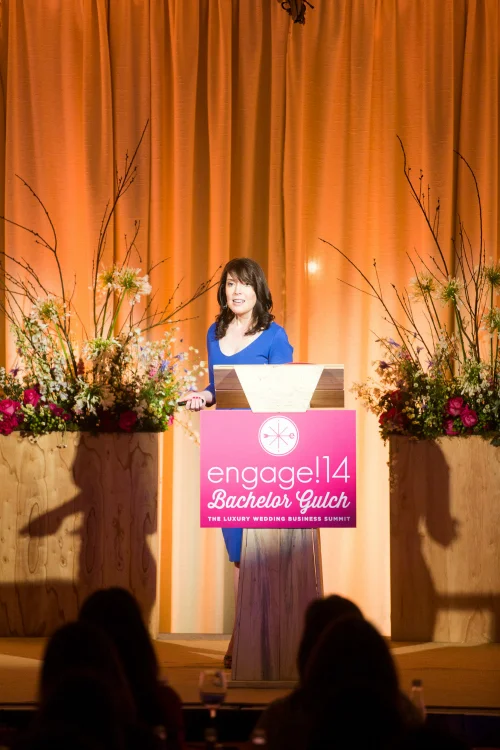Tips for pricing confidently.
Photo by John Cain Sargent
I spent a whirlwind 48 hours in Kuwait last month, giving the keynote at the BBH Masterclass and visiting my friend Bibi Hayat’s jaw-droppingly gorgeous café that she opened during the pandemic.
In the course of my conversations with others over that too-short weekend, the topic of speaking professionally and all that goes with it (expectations, pricing strategies, taxes, presentation prep) came up a few times.
For those of you who also do public speaking or want to get into it, I’m dusting off this old post from the Splendid Archives on the different speaking fee pricing models and formulas you can use.
Speakers fees in the wedding industry are often shrouded in mystery and, quite frankly, are usually numbers just pulled out of the sky.
In addition, most wedding conference hosts or wedding workshop owners don't have experience doing corporate event planning, so they don't necessarily know how to appropriately budget for their conferences or for their speakers. This can cause sticker shock, hurt feelings, and resentment for both speakers and conference producers alike. It doesn't have to be this way.
If you’re interested in charging what you’re worth for your speaking engagements, here’s what to know so you can price your speaking fees with confidence:
How does a speaker price their speaking rates?
Some common pricing models that public speakers in the wedding industry use include:
LOSS LEADER
Using a loss leader pricing model means the person will speak for free or for a non-competitive rate (AKA so low others can't compete with it) in order to gain potential sales in another area of their overall business.
Examples of this would be a graphic designer wanting to get in front of potential new clients, a photographer promoting a new online course, or a wedding planner who has a book coming out.
This can be a very effective way to build your speaking resumé, get your name out to the industry when you're in the launch years of your business, or to strategically align with other companies you want to work with.
Just remember that in the U.S. you still pay taxes on any speaking engagements you do for free if you were compensated in some other non-cash form, such as a comped hotel room, flight, or conference pass. The IRS considers the total fair market value (which is typically full retail price) of those things to be your compensation and taxes it as income – even though you never received actual cash.
For example, if you say yes to speaking at a conference for free and in exchange they comp you the $3000 conference pass, $2000 hotel stay, and $500 flight, the IRS considers that to be $5500 in business income even though you did not receive $5500 in cash. You now owe taxes on that $5500. You are literally paying to speak at that event.
Whether or not this makes sense for your business will depend on the financial projections you run on the future sales income you'll generate from speaking at the conference. You can also figure out how to increase your deductions to offset it. Either way, free is never really free.
When it comes to the speaking engagements and opportunities you say yes to, trust your gut, but ALWAYS do the math.
FLAT FEE
This is a flat number that the person is willing to speak at an event for. Usually these are increased each year, so a person's speaking fee for 2023 would be more than it is right now for 2022, which is more than what they were charging in previous years.
Some people also have one flat fee for speaking engagements within their country and a different flat fee if the event is international.
PER PERSON FEE
This type of speaking fee is calculated by setting a price per attendee. This means that the rate for speaking at a conference with 400 attendees would be more than an intimate retreat with 40 attendees.
In a sense, this pricing model is similar to the concept behind royalties for book authors or residuals for TV writers and actors: the more people who consume the creative product, the more the creators of that product get paid.
HOURLY RATE
An hourly rate (AKA billable hours) takes into account all the hours involved in preparing and delivering a speech: the time on stage, as well as any research, writing the presentation itself, practice and rehearsals, travel time to and from the event, etc.
If preparing for a presentation requires a lot of time away from the work of your core business, an hourly rate can help you make up whatever money you're not making when you're unable to use that time for site visits or creating event design concepts.
DAY RATE
For this pricing model, the speaker calculates how much a day of their time is worth, and charges accordingly.
For example, if a conference wants a speaker to be present for the full three days of the event, mixing and mingling with attendees, the speaking fee would be the day rate multiplied by three.
Some speakers also include travel time away from the office in this rate, so a 3-day conference might be quoted a fee based on four or five days, depending on how long it takes the speaker to travel there, door-to-door.
"EFF IT, I’LL DO IT” RATE
This pricing method is super controversial, but it does get used, so we'll talk about it: if a person really does not want to accept a particular speaking invitation, there is sometimes a price at which they're willing to say, "Eff it, I'll do it."
Here's an example not from a speaker, but of a wedding planner I know:
After the planner fired a nightmare client, the mother of the bride called her and said, “We’ll pay whatever it takes to get you back – there’s no number too high, name your price.”
The planner replied, “OK, for all the trouble and drama you put me and my staff through, we’ll take you back as a client for a wedding planning fee of $1 million.”
$1 million was this planner’s “eff it, I’ll do it” number for a crazy client she did not want.
A note on this method: if you’re quoting an “eff it” price for every speaking engagement, it may be a sign that you really just hate public speaking and should possibly explore another career path that brings you more joy and pays you a sustainable amount more consistently.
The pricing model you choose should be based on what best serves your core business model. It is different for everyone, because everyone has different strategic goals.
The Speaking Fee Formula I Often Use
For speaking engagements, I often charge a per person fee – with a minimum – as well as protections for scope creep.
CALCULATING YOUR SPEAKING RATE PER PERSON
The per person speaking fee is calculated using a value pricing model, meaning the price is determined based on how much value I bring to the table, or in this case, the stage.
Here's how that math fleshes out:
I calculate the total minimum financial value of my content for one attendee.
To figure out the value of my presentation’s content, I start with this question: “If one attendee implements everything I share on stage, how much money will it bring to their business in a given time frame?”
I choose to err on the side of being conservative in this estimate, and my time frame is generally one year – a reasonable amount of time for an attendee to go back home, implement what they’ve learned, and start to see some results.
This gives me the per person value of my content.
I then multiply the per person financial value by the total number of expected attendees.
This gives me the total value of my content to the entire audience as a group.
I then divide the total financial value by 25.
Why 25? Because the number of people who go home from a conference and actually implement what they’ve learned is shockingly low. Research has shown this to be true across almost every industry, not just weddings.
This number is my total base speaking fee for the event.
I then divide the total base speaking fee by the number of expected attendees.
This is my per person fee.
Pro tip: the faster way to determine the per person fee is to divide the per person value (calculated in step one) by 25.
EXAMPLE SPEAKING FEE
Here’s a pretend example of a per person speaking rate. For the sake of simplicity, I’m using round numbers:
Let’s say the event is a conference for wedding planners and the average planner in attendance charges $5,000 for full service planning. The conference has 100 attendees and the hosts want me to speak for one hour or less.
I’ve determined that if each planner in the room takes all the information I shared in this particular presentation and implements it once they’re back home, they will book X amount of weddings over the next year.
For this example, let’s be ultra conservative and say it’s just one additional $5,000 wedding on top of what they normally book.
$5,000 in new revenue booked because of my talk x 100 attendees = $500,000
This means that the total value of my content to the entire audience is worth $500,000.
If every single person at the wedding planners conference sells one additional wedding at $5,000 each because of what they learned from me, they'll have collectively brought in an additional half a million dollars in revenue.
I then divide that total audience value of $500,000 by 25.
$500,000 in new revenue value divided by 25 = $20,000 total base speaking fee
This is the total base speaking fee I’ll be paid for speaking at this conference.To get the final per person fee, I divide the $20,000 total speaking fee by the number of conference attendees.
$20,000 total speaking fee divided by 100 attendees = $200 per person
This means my base fee for that wedding conference is $20,000, which works out to $200 per person.
The faster way to determine the per person fee is to divide the per person value calculated in step one by 25.$5000 divided by 25 = $200
A SPEAKING ENGAGEMENT SALES TIP
If you want to lessen potential sticker shock when quoting your speaking engagement rate, include the per person price in your fee quote.
It’s much easier for a conference producer to wrap their head around $200 out of every $3,000 individual conference registration fee than it is if they only see a large speaking fee with three or four zeroes at the end of it.
The per person price also allows them to think more clearly about their conference budget and see that you may be way more affordable than they initially thought.
SPEAKING FEE MINIMUMS AND SCOPE CREEP
As far as the speaking fee minimum and protections for scope creep go, here is how I often handle those:
The initial fee agreed to and listed on the contract is the minimum rate, so if fewer people register than expected, the conference isn't entitled to a partial refund from me.
Preparing a compelling, relevant, and valuable presentation is my responsibility as a speaker.
Conference registration sales and marketing is their responsibility as the event owners.
As far as speaking engagement scope creep is concerned, if the conference decides to open its doors to more people after our speakers agreement is signed, I would be owed an additional per person fee (at the contracted rate) for each attendee once the attendance/registration count reaches 15% above the original estimate.
So for the example we've been using, if a wedding conference for planners with 100 expected attendees ends up selling 115 tickets, I would be owed an additional $3,000, for a grand total speaking fee of $23,000. ($200 contracted per person fee x 115)
Remember, the theory behind the per person fee model is that the more people who benefit from or consume the content, the more the creator gets paid.
This also affords me time to do the extra homework now required by the increase in attendees and protects against any potential bait and switch, such as a conference intentionally quoting a lower attendee number in order to pay me less.I chose to set the scope creep at 15% above the original expected attendee amount because I felt that was fair to both myself as well as any conference producers. Pricing out services like speaking fees always includes a bit of a subjective element, and this number didn’t make me feel smarmy.
Using our running example above of 100 attendees, if the conference sells three extra tickets, I'm not going to bill them for $600. And if they sell 114 tickets, they still get me for the price of 100. No one likes to be nickeled and dimed.
How I Calculate the Financial Value of My Content
When calculating the financial value of my content for wedding conferences, I ask a few questions:
WHO IS THE EXPECTED AUDIENCE FOR THIS SPEAKING ENGAGEMENT?
I always want to know who the conference is for and what level the attendees are at in their careers. I also consider which specific industry segments will be included in the audience.
In the speaking fee example above, I used wedding planners charging at the low end of industry standard pricing for flat-rate, full-service planning.
This is obviously not going to be the audience for every wedding conference or educational workshop I speak at.
Different audiences get different presentations because they have differing needs and differing business models and the tangible financial value they derive from my content will not be the same.
This means my per person fee will be different for each speaking engagement.
For example, an audience of wedding dress boutique and bridal store owners who target the mass market with more attainable price points for their wedding dresses (say $1500 or below) would change the calculations when it comes to what the information I provide would conservatively add to their annual revenue.
Please don't click out of this post thinking I charge $20,000 or more for every wedding conference speaking engagement. The math doesn’t work that way.
WHAT ARE THE RESULTS FROM MY PREVIOUS WORK AND EXPERTISE ON THIS TOPIC?
I also determine the value of my content based on the feedback I receive from attendees of my previous speaking engagements and the stories they share about how their respective businesses improved because of the information I taught on stage.
Here’s where all of this gets even nerdier: Every single piece of feedback I receive – verbal or written – gets entered in a spreadsheet on Google Drive, meaning I literally have years and years worth of data and measurable outcomes to evaluate.
When a wedding industry attendee from one of the Engage Summits I spoke at told me that using the strategies I shared on stage landed them a $12 million multi-year contract with a new corporate client, I entered that into the spreadsheet.
While not everyone will book $12 million in new business after hearing me speak, that data point shows that there is measurable and tangible financial value in what I have to say.
It helps to have all this info in one place so that I can easily reference it when I’m considering the specific value of my content to a particular audience. It also helps on days I feel down to read through and be reminded that what I do does help people in very real ways.
WHAT IS THE TOPIC FOR THE SPEAKING ENGAGEMENT?
I am known for giving presentations with a lot of actionable content that can be implemented almost immediately. I know how the strategies I share can change a person's business, which makes doing the math on the specific content value of a presentation easier.
My talks are typically not the ones with the story of my life tied to larger universal lessons that make people cry. While I am occasionally asked to share my personal story – and it does tend to leave attendees inspired and motivated – it contains far less immediately actionable content.
There is definitely financial value in the more inspirational-style speeches, since big ideas are born out of inspiration, but it is much more difficult to measure how that will affect specific financial change in an attendee's business.
A Splendid tip: If you tend to mainly give inspirational talks and find calculating attendee ROI difficult to do in a fair way, a flat fee may be a better pricing model for you than a per person model.
What else should be considered in a speaking fee?
While I don't charge an hourly or daily rate for speaking, I do feel that my price should be fair with regard to the amount of time I put into a presentation.
A lot of people view public speaking as less than an hour of work because they judge it by the amount of time you spend on stage. In reality, it’s so much more.
Think about it this way: is the total amount of time you work on a wedding only 8-12 hours on the day of? Of course not.
The same is true for speaking.
Good keynote speakers spend an average of 90 minutes of prep for every 1 minute of their presentation. That means a 20 minute speech takes a minimum of 30 hours to create.
This is part of the reason good speakers charge higher speaker fees – it’s not because of ego.
Here's a little about the behind-the-scenes and energy required for every speaking engagement I take on:
HOW I PREPARE FOR SPEAKING ENGAGEMENTS
I don’t give canned speeches and all of my talks are sales-pitch free. Every presentation is written for the particular conference or workshop I’m presenting at, with the specific audience in mind.
When I say specific audience, I mean specific.
I go through the entire attendee list ahead of time (yes, even for conferences with 500+ people) and look up every single person’s website and all of their social media. I read through any and all reviews they may have on WeddingWire, The Knot, Google, or Yelp. I make notes in a spreadsheet. I study those notes.
By the time I step on stage, I know exactly who is in that room, what they do, their aesthetic, their point of view, as well as how they feel about Matcha lattes, their thoughts on Meghan and Harry, and whether they prefer pilates, Peloton, or F45.
I prepare for a speaking engagement like it’s my job, because it is my job.
HOW I SPEND MY ENERGY AT BUSINESS CONFERENCES
At the conference or workshop itself, I generally stay up late, hanging in the hotel lobby, letting attendees pick my brain as well as giving bossy, unsolicited business advice based on the hours of Insta-stalking noted above.
Part of the value wedding conference hosts see in me is this off-stage time I’ll put in with their attendees at their event.
As an introvert, I know I can only healthily do this if I leave room for alone time in my schedule the day after an event ends so I can recharge. My fee needs to be a number that allows me to do this.
If you’re an extrovert who draws energy from being around people, you may be able to jet off to an important meeting the next day, fully charged from the event.
If I priced myself low in order to compete on volume, I would burn out trying to meet my financial goals. I’ve burned out before. It is hell. The recovery process is long and hard. I’m never going back to that.
This means that if I calculate a speaking fee and it comes in below a certain number, I turn it down and refer someone else who may want the opportunity. Both my well-being and my business model depend on this guideline.
You know best how you are wired and what you personally need in order to run at full capacity, so make sure your business is designed in a way that allows you to thrive not just financially, but emotionally, mentally, and physically as well.
It is not greedy to charge money for speaking engagements, just like it is not greedy to charge money for photographing a wedding or for designing invitations.
Public speaking is a job and, if you choose to add it to your business offerings, it should be treated like a job. Choose a pricing model that works for you and charge your worth.
Written by
LIENE STEVENS
Liene Stevens, the founder and CEO of Think Splendid, is an author, speaker, award-winning luxury business strategist and behavioral psychologist.
* * *
Founded in 2005 and trusted by clients in 97 countries, Think Splendid is the global leader in wedding business consulting.
We provide strategic guidance to industry leaders, luxury brands, hotels, and tourism destinations that serve high net worth and ultra-high net worth brides, grooms, and wedding guests.





















